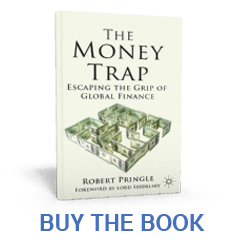Beijing sets out its stall
How China will challenge the western hold on world money
Although the gloss has worn off the market’s initial enthusiastic endorsement of Beijing’s ambitious reform plans unveiled last month, there is little doubt they represent a major further move towards freeing financial markets – and promoting the international role of the RMB.
In addition to changes in how companies file for stock market listings and the introduction of a bank deposit insurance scheme, interest rate liberalization will be accelerated. The roadmap seeks to roll back government control of state-owned enterprises and allow for greater competition with private firms. Later briefings establish that the People’s Bank of China will build on its growing reputation and place in China’s power structure to further underpin its relative independence and room for autonomy. As in other countries, such as the United States, central bank independence is never absolute – the Fed is rhe creature of Congress, after all. So In China the PBOC remains at the heart of the ruling power structure. That signifies stability. it is essential to underpin the ambitious plans for internationalising the RMB.
Chinese spokesmen are increasingly aggressive and ambitious about the direction of monetary reforms. They are aware there is likely to be stiff competition among budding vehicle and reserve currencies as the candidates jostle for their place in the international monetary firmament.
Beijing is well aware of the relative failure of Tokyo’s much trumpeted plans in the 1980s to internationalise the yen. They put this failure down to the fact that the Japanese economy never achieved full parity with that of the US. But more important was the ambivalent attitude of Japanese authorities to foreign use of the Japanese yen. It was one of ostensible welcome mixed with distrust and inquisitiveness. They insisted on tracking and carefully monitoring transactions in Tokyo by foreign official institutions. They seemed fearful of the full implications of the yen becoming a leading reserve currency. Will Beijing authorities really be willing to let go when Tokyo could not? One doubts it, but the authorities seem determined to try.
They know that to achieve parity with the dollar they will need genuinely open financial markets, a minimum of oversight and interference, full convertibility, sustained economic strength, an independent central bank with a trusted system of prudential regulation – and respect for property rights. It’s a tall order.
But the race is on for the next generation of reserve currencies. Economies of scale mean there is only room for two or three at the top at any one time. If the euro can sort itself out, it must be favourite to succeed to the dollar’s crown, which leaves only one or at most two places for all current emerging markets – and don’t forget sterling, still hanging in there with some 5% of reserves. London’s markets and its many world-class services mean it will remain a global hub for many years to come. It could even increase its role as a favoured alternative to New York should the dollar’s crown slip. It’s also fun to visit.
What China will bring to the table is sheer economic muscle and financial fire-power. If its commercial banks follow its direct investors abroad, as the American banks did 100 years ago, they will lay the basis for sustained development in the role of the RMB.
Beijing knows it cannot replace the dollar as the dominant currency. The role will have to be shared. But that by itself means changing the entire system, which up to now has always depended for its success on a hegemonic currency. Equally, successful globalisation requires a hub, a monetary standard. Beijing knows that this will not in the long term be suitably constituted by a national or regional currency.

